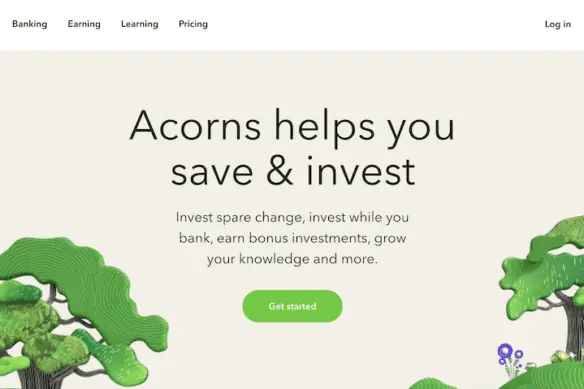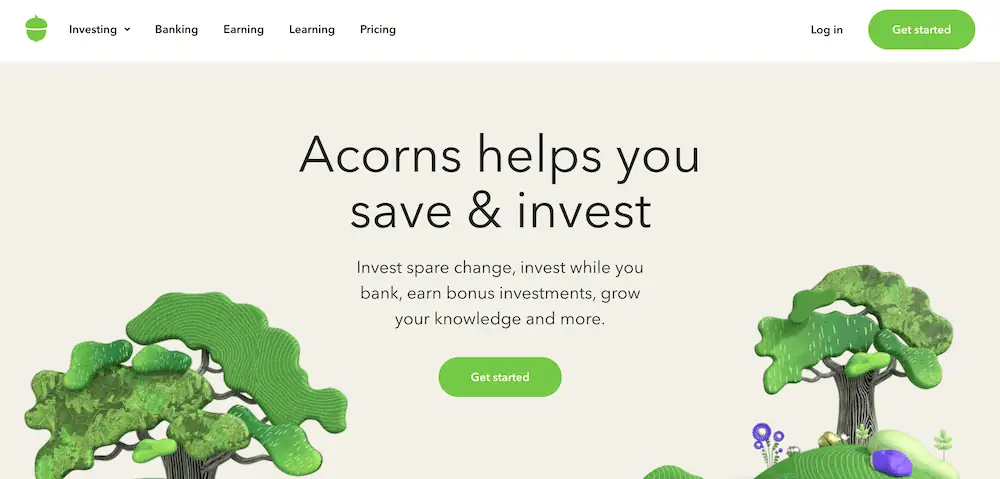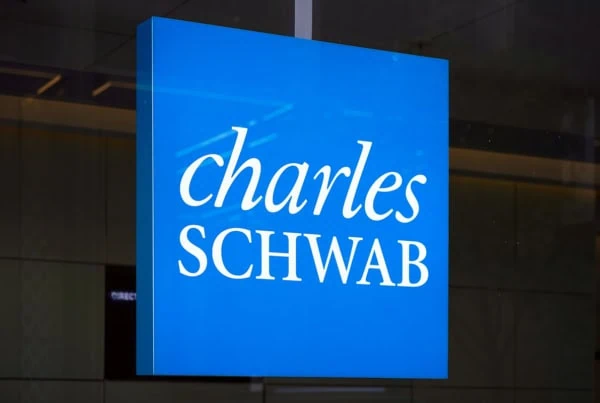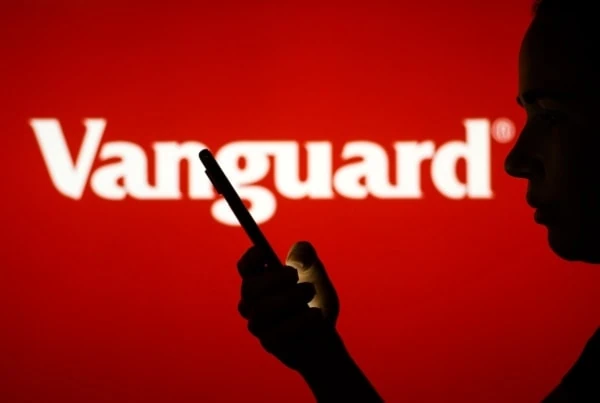Acorns is an investment and banking platform which allows its users to invest spare change, round up purchases, or use an approach otherwise known as micro-investing.
Acorns finances its business with ongoing monthly subscription fees for platform users. Depending on the plan you choose, you gain access to different features and products.
These subscription fees can appear large as a percentage of your account balance in the beginning, but can quickly become miniscule relative to your entire investment account and bank balance held on the platform.
This post looks at the question of “how does Acorns make money?” in greater detail, providing you insight into how this leading micro-investing app has gotten millions of individuals to buy their first investment– often without noticing.
What is the Acorns App?
The Acorns investing app for beginners tracks your purchases and rounds up the spare change to invest or cover future expenses such as emergency funds.
The company divides its service plans into three primary categories:
- Investing spare change in exchange-traded funds (ETFs)
- Funding an individual retirement account (IRA)
- Banking activities with a checking account and linked debit card
To purchase these services, you need to subscribe to the following plans:
- Acorns Personal ($3 per month): Includes an Acorns Invest investment account, as well as Acorns Later for tax-advantaged investment options such as Roth IRAs. Also includes Acorns Checking, a bank account that has no account fees, lets you withdraw fee-free from more than 55,000 ATMs nationwide, and Smart Deposit, which allows you to automatically invest a bit of each paycheck into your Acorns accounts.
- Acorns Personal Plus ($6 per month): Everything in Acorns Personal (Acorns Invest, Later, and Checking), plus Premium Education, which are live onboarding sessions covering account setup, Round-Ups, setting up recurring investments, and more; Emergency Fund; and a 25% bonus on Acorns Earn rewards (up to $200 per month).
- Acorns Premium ($12 per month): Everything in Personal Plus, plus Acorns Early, which allows you to open a custodial investment account for your child so you can begin investing for them while they’re a minor; custom portfolios that allow you to hold individual stocks; live Q&As with financial experts; a 50% match on Acorns Earn rewards (up to $200 per month); $10,000 in life insurance; even the ability to set up a will for free.
Personal Plus and Premium subscribers also get access to a powerful way to accelerate their savings: Later Match. While most people are aware that employers will sometimes match funds you contribute to your 401(k), “matches” are virtually unheard of in retirement accounts like IRAs, where there’s no employer to kick in extra cash. However, Acorns itself will match 1% or 3% on new contributions to IRAs for Personal Plus and Premium subscribers, respectively.
What are Micro-Investing / Spare Change Apps?
A micro-investing app such as Acorns is a program that allows people to invest small amounts of money into diversified investments like index fund ETFs – usually between $20 and $500 – making it easier for those who don’t have much money or are not confident managing their own funds.
Micro-investing apps allow users to set a goal amount of money to invest, and the app will round up purchases made with linked cards or bank accounts to the nearest dollar.
This means that when someone is enjoying an iced coffee for $3.75, Acorns rounds it up from $3.75 to $4 so they can buy more shares in a diversified index fund ETFs.
By investing little by little, users can grow their investments over time.
Some people prefer micro-investing apps because they don’t have time to track their investment portfolio on their own while juggling work, school, family life and other commitments; others use micro-investing as another source of income through spare change investing.
Many millennials and Gen Zers prefer Acorns as the app offers entryway into the world of investing without needing to make a significant capital investment upfront.
Because the app doesn’t charge trading commissions, users can start with practically nothing in their investment account and earn money as they go through the company’s “Round Ups” feature and by making small, recurring deposits.
Many stock trading apps have entered the market in recent years by slashing trading commissions to nothing and largely relying on monetizing their order flow or offering other services to provide added revenue.
Apps like Robinhood, Webull, M1 Finance and others have driven a new expectation in investing apps: no commissions and the ability to invest from the convenience of your smartphone.
Acorns does not earn money this way and instead primarily relies on money received through on-going subscriptions.
Related: Best Debit Cards for Teens
How Does Acorns Make Money?
The Acorns investing app primarily earns money from two main sources of revenue.
The subscription revenue it earns on its recurring plans provide most of its top-line revenue while the interchange fees it earns from users’ debit card purchasing activity adds an extra income generation source.
1. Subscription Revenue
Acorns offers three subscriptions plans: Acorns Personal, Acorns Personal Plus, and Acorns Premium. These plans charge $3, $6, and $12/mo., respectively.
These account subscriptions represent the lion share of Acorns’ revenue streams. With over 8 million subscribers as of the end of 2020 the company makes between $8 million and $40 million per month on subscription fees, of $96 million and $480 million per year.
2. Interchange fees from purchases made with their Acorns Spend debit card.
When you deposit money in Acorns’ checking account and debit card for kids, their equivalent to a high-yield savings account, and receives insurance coverage through the customary $250,000 of FDIC coverage.
Acorns uses Visa to process its debit card transactions and receives an interchange fee for the transaction.
Depending on the type of network and transaction, Acorns could have earned between $0.22 and $0.54 per debit card transaction in 2018 based on the average interchange fees seen in the industry.
The interchange fees cover transaction processing and fraud losses. However, any unused funds count toward Acorns’ bottom line.
Related:
What are the Two Acorns Spare Change Plans?
→ 1. Acorns Personal ($3/mo)
Acorns Personal is the subscription plan that comes with the company’s first product offered back in 2014: Acorns Invest. It offers the first-of-its-kind investing solution called “Round Ups.”
Acorns, made famous by its “Round Ups” feature, takes the purchases made on a linked card and invests the difference between the price you paid the the nearest whole dollar.
For example, if you purchase a coffee from Starbucks for $2.50, the Acorns app rounds up the purchase to $3 and invests the $0.50 difference on your behalf in index fund ETFs.
Acorns Invest places your money in low-cost index fund ETFs to diversify your contributions as you invest over time.
By opening an account with Acorns, you can also earn a free sign up bonus. Read this article on how to get free stocks to learn how you can earn your sign up bonus from Acorns.
The company recently evolved its offerings to brand Acorns Personal as the “all-in-one” financial solution. It comes with the Acorns Invest feature and its “Round Ups” as well as Acorns Later and Acorns Spend.
Previously, these came on a lower-priced, $1/mo Acorns Lite plan. The company discontinued this plan in fall 2021.
Acorns Later is a retirement account, which can be funded by linking your bank account to Acorns and investing a percentage of the money you deposit in “Round Ups” or from other contributions.
Acorn Spend allows cardholders to spend with their linked debit cards without paying fees on purchases, ATM withdrawals or foreign transactions associated with typical credit cards – these are all free for Acorn users!
The company also offers a feature called “Found Money”. This is a feature in which you can find discounts and cash back offers from partnering companies. The savings are then deposited into your Acorns account.
→ 2. Acorns Personal Plus ($6/mo.)
Acorns Personal Plus includes all of the features of Acorns Personal, but it also includes benefits such as Premium Education, which are live onboarding sessions covering account setup, Round-Ups, setting up recurring investments, and more. You can also add an Emergency Fund, and you get a 25% bonus on Acorns Earn rewards (up to $200 per month).
→ 3. Acorns Premium ($12/mo.)
Acorns Premium includes all of the features of Acorns Personal Plus, with the added ability to invest for kids through the kid investing app’s custodial account (Acorns Early).
A custodial brokerage account is where parents deposit funds for kids until they turn 18 years old (or reach the legally-defined age of majority in your state of residence) and then take control of the account and its assets themselves.
This means that any investments made on behalf of the child are held in trust and cannot be touched before custodianship from a parent ends.
When children sign up for Acorns Premium, they do not have access to their account information unless an adult is designated as Custodian (this is usually the parents). When kids turn 18 or become legally-emancipated they can access and control their shares in the account.
Once a child becomes the individual responsible for making investment decisions, they can decide how much to invest and allocate funds across different asset classes just as any Acorns user would be able to do with their own account.
The added ability to invest for kids through the kid investing app’s custodial accounts means that children will not only be able to save for their futures, but they’ll learn how to do it responsibly.
- Acorns allows you to sign up for investment, retirement, and checking accounts for you and your family, learn how to earn more money, and grow your investing knowledge.
- Famous for investing spare change automatically through Round-Ups, this all-in-one financial app helps younger generations start investing earlier.
- Invest in expert-built portfolios made up of diversified ETFs.
- Silver tier includes perks such as a 25% match on Acorns Earn rewards (up to $200/mo.), generous APYs on Checking and Emergency Fund, and live Q&As with investing experts.
- Gold tier includes perks such as a 50% match on Acorns Earn rewards (up to $200/mo.), $10,000 in life insurance, picking individual stocks for your portfolio, a free Acorns Early account, and Acorns Early Invest custodial accounts for children with 1% contribution matches.
- Earn even more with Later Match: Acorns will match up to 1% (Silver) or 3% (Gold) of all new IRA contributions in your first year.*
- Special offer: Get a free $20 bonus investment when you sign up with our link and start making recurring investments.**
- Robo-advisor with affordable fees (on larger portfolios)
- Fixed fee model
- Round-ups
- FDIC/SIPC insurance
- IRA match (Silver and Gold)
- High fixed fees for small balances
- Limited investment selections
- Must subscribe to Gold for any self-directed investing options










